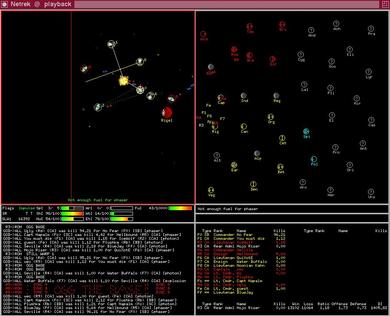|
A bit of nostalgia today for Netrek, one of the best online games ever. It’s from the early 1990s and is an important game design precursor to team based online games. Also its netcode was a huge breakthrough in real time Internet gaming. The game design is brilliant. It’s an 8v8 team game. You mostly play in the upper left window, a Spacewars-like game where you fly your spaceship around and zap other players with your phasers and torpedoes. But the real game is in the upper right, the galactic overview map. The goal is to fly to planets and take them over by beaming down armies while fighting off the enemy players. That combination of high level strategy and local tactics is a hallmark of RTS games like Starcraft, MOBA games like League of Legends, and squad FPS games like Battlefield. I’m not saying Netrek invented that whole idea (Netrek itself was based on PLATO Empire), but it took 5–10 years before mainstream games became as interesting as Netrek. There were even classes in the game, different types of spaceships for different roles. The network code was also hugely innovative, particularly the UDP code from 1992. Back then the Internet was overloaded and slow, 56 kbit/s links were common. Andy McFadden rewrote the original TCP netcode to use UDP and suddenly the game became way more playable on congested links. The key insight is UDP lets the game client decide what to do about packet loss rather than relying on TCP retransmits. Netrek could afford to lose the occasional packet; you might not see a torpedo coming your way but then again you didn’t have to wait 3 seconds for that packet before seeing the 25 other torpedoes launched afterwards. Weirdly most contemporary games use TCP (despite drawbacks), although League of Legends at least is UDP. Netrek partly benefitted from the great community of the academic Internet of the early 90s. I’ve run into a few old Netrek buddies in our later careers as working software people: Andy McFadden and Jeff Nelson at Google and Stephen von Worley of DataPointed. I wonder if any of the Netrek folks went on to work in the gaming industry? Thanks to Brian Dear
for info on PLATO
|
||

